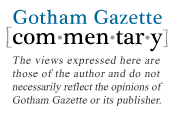The vote in Albany deciding whether or not to reauthorize the law giving the mayor control of New York City's public schools is approaching quickly. A vociferous effort by defenders of the old system has recently dampened the support for keeping the power in the mayor's hands.
Opponents of reauthorization -- including the teachers' union and many Bloomberg administration critics -- have won the most ground with their argument that mayoral control is undemocratic. But there is a difference between a democratic political system and a democratically run bureaucracy. New Yorkers shouldn't let such arguments persuade them to return to the bad old days, when no one was responsible for the city's schools.
The Bad Old Days
The old system of an appointed, unaccountable Board of Education bred a culture of inaction and crippled Gotham's schools. Though opponents of reauthorization say that they don't want to go back to that exact system, for all practical purposes their proposed "tweaks" to the law would do that.
Mayoral control broke the stagnation produced by an unaccountable system. While some may still disagree with Mayor Michael Bloomberg's specific reforms, there is little doubt that mayoral control has been essential in moving education reforms forward.
Despite the allegations of those opposed to reauthorization of the current law, there is nothing inherently undemocratic about the mayor controlling a large city bureaucracy like the school system. After all, the mayor controls other city services -- police, fire, sanitation and others -- with little complaint that his power is dictatorial. Of course, public schools have a uniquely democratic purpose in providing children with the knowledge they need to be effective and productive citizens. But that hardly means that day-to-day school operations must be governed democratically.
As in other policy areas, democracy's role in education is to put in place representatives who reflect the will of the people and hold those policymakers accountable for their cumulative decisions. Relying on such democratic processes to decide each individual policy is impractical and only leads to the stagnation and the poor results of Gotham's past.
The Parents' Part
Mayoral control does nothing to deny parents their essential role in education. Parents are in the best position to know what is best for their individual child. But, as with other government agencies on which we rely, the mayor is in the best position to make decisions that affect the broader education system.
That said, parents and communities do have a large stake in schools, and they should be consulted about important policies. But the mayor couldn't avoid communicating with them even if he wanted to. Those opposed to his school policies aren't exactly silent. Dissenting voices have spoken out against just about every policy the Bloomberg administration has pursued. While the mayor has the final word, he pays a political price when he goes against the true will of the people, and doing so takes a toll not only at the voting booth but in his ability to govern. Just because those opposed to recent reforms often have not gotten their way does not mean that they did not participate in the governing process.
Gotham's $18 billion school system, which operates more than 1,400 public schools, is a complex bureaucracy that requires a decision-making entity -- namely, the mayor. Mayoral control should be renewed.

Marcus Winters is a senior fellow at the Manhattan Institute.





